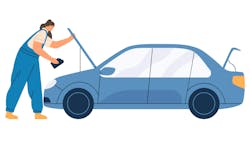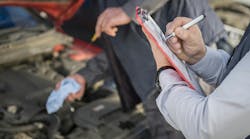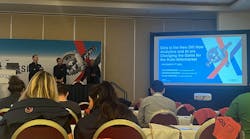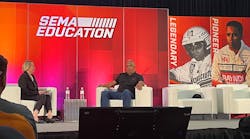Everybody loves an underdog: someone who overcomes all doubt and obstacles to achieve success. Women have long been the underdogs of the automotive industry, and today are still having to fight for a place within it, in spite of the fact that it is a demographic brimming with innovative thinkers.
No one else is setting a better example of this than Brynn Wimmers, who at only 17-years-old, has found a job she loves after becoming trained as a lube tech at the West Divide Valvoline Instant Oil Change in Bismarck, North Dakota. Wimmers spoke with NOLN about how she discovered her path–and what sometimes can stand in the way of others discovering theirs.
The Odd One Out
Active, hands-on work has always appealed to Wimmers, making the world of automotive service a natural fit for her. However, she has faced a unique set of deterrents because of her gender.
Though Wimmers had taken auto tech classes in the past, it was not a welcoming environment, specifically towards her. It didn’t take long before she noticed the differences in how her teacher treated her and her male classmates. She began to feel unaccepted; like she was unwanted.
For many young people, their first introduction to an automotive career is an automotive class–especially for kids like Wimmers, who as a young girl growing up, was not taught how to do many tasks her male peers learned. Her experience underscores the importance automotive instructors play in determining the path of many potential technicians.
“What I want to see is the expectation being truly held to teachers that they're going to treat the girls in their class with the same respect that they treat the males,” said Wimmers.
Finding Her Place
Fortunately, Wimmers would once again be drawn to the automotive trade. She enrolled in a welding class, where she was surrounded by people supportive of her ambitions.
Upon telling a friend in her welding class how dissatisfied she was with her retail position, Wimmers’ friend suggested she come work with her at the West Divide Valvoline Instant Oil Change.
“She said ‘Come work with us, it's a great environment; It's really fun, you learn a lot,’” recalls Wimmers.
After being brought on to the team, Wimmers mentioned starting her new job to her welding teacher, who had some advice for her that she had never received before.
“He said, ‘Listen, you can do whatever you want. But do it with pride, and be picky about what you do, and be picky about how you do it,’” tells Wimmers. “And that was the biggest thing is I was never really taught at a young age to take pride in my work.”
If there’s anything Wimmers should be, it’s proud. In the short time since she’s joined Valvoline, she’s gone from not knowing how to read a dipstick to being certified in top-side work and as a customer service representative.
Her parents were supportive of her new job, but some family members expressed harsh disapproval. This is not an uncommon problem for many technicians, as there exist some negative assumptions about the trades–but the judgment can be particularly aggressive to women entering the field.
Though many have underestimated her based on judgmental beliefs, the supportive figures she’s gained empowered her to rise to her true potential. While her welding teacher taught her to maintain pride and dignity, upon entering the shop she also needed to learn to let her guard down. She was respected here and as valued as any other team member.
“All of my coworkers, and managers, and people above me, and Valvoline–they have been so supportive, and so encouraging,” says Wimmers. “I often try to do everything by myself. And I think a lot of people here have been telling me, ‘We got your back, we’re your safety net. Keep pushing, you got it. You are capable.’”
Being the Change You Want to See
It hasn’t all been positive, though. After being covered by a local news station on her work as a lube tech, Wimmers was exposed to a wide audience of people online–many of whom had nothing productive to say. From what Wimmers saw, most of these negative comments were from people who did not work in the automotive industry. Some made comments saying they would never let a woman work on their vehicle, while others dismissed it as being nothing special.
Wimmers’ story isn’t being spotlighted because she’s an extraordinary case, rather to serve as another example of what a demographic making up half of the population has to offer to an industry in need of more techs. The support she’s received is not solely a product of kindness, but a reasonable response the field is having to encourage more talent like her.
Just like any other individual, Wimmers brings her own set of unique strengths to the table. Being 5’4”, she may not be able to move heavy equipment, but other traits such as smaller hands that can fit in tight spaces, a close attention to detail, and a knack for diagnosing problems quickly makes those potential weak points moot.
Automotive programs undoubtedly play a huge role in inspiring kids from an early age to consider an automotive career, but these resources often are even more impactful for young women, who aren’t typically offered as many opportunities to experiment with the trade.
When Wimmers leads tours of the school district’s automotive classrooms to eighth-grade students, she sees them marvel at all the shiny equipment, fascinated with all the processes they’re seeing.
The interest is there with students, but it’s on industry leaders, instructors, and schools to step up for them. Proper funding is needed to provide kids with an introduction to automotive work that will inspire them and make them want to stay, and supportive teachers are tantamount to that.
For a long time Wimmers has had her eyes set on the trades, but the dismissal of her abilities she still remembers from automotive instructors in the past could be what drives another talented potential tech away from pursuing the career path.
Not only do teachers and workplace leaders need to hold the same expectations for female students, but need to set an example for everyone else in the class and be willing to address behaviors that can disproportionately affect young women trying to enter the field, such as sexual harassment.
“Just because we've come so far, doesn't mean we need to stop. We need to keep striving for treating everyone equally, for upholding those sexual harassment policies; we need to keep looking at educating our youth, we need to make sure that people know that this industry is available to them,” says Wimmers.





